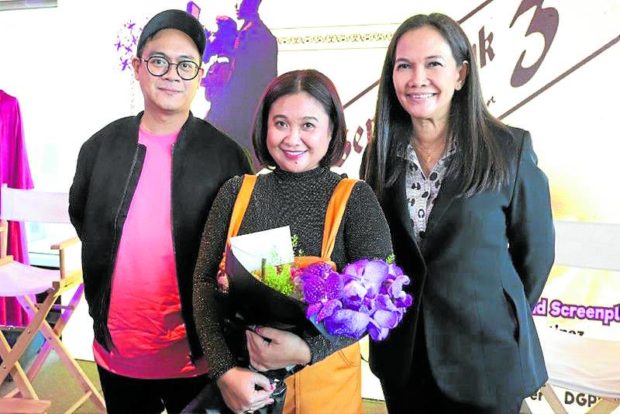You have to have libog (loosely means lust), but put in a sanitized context.”
This was according to film producer Joji Alonso when Inquirer Entertainment asked her what someone like her sees in an artist to say that the latter will eventually end up as a star.
“I’d rather not use that word, though. Let’s just say he has to have an ‘it factor.’ One example is Kit (Thompson, lead actor in the drama ‘Belle Douleur,’ which she directed and produced). Before casting him, there were other options but my team and I just couldn’t find that ‘L factor’ in them. I said, how do I entice my audience to watch? They have to fall in love with the character, and that character has to be able to seduce my audience without showing much,” explained Joji, who is the founder and COO of Quantum Films.
Other examples are Jennylyn Mercado and Derek Ramsay, who appeared in Dan Villegas’ hit romantic-comedy “English Only, Please” (2014). “At that time, both Jennylyn and Derek weren’t as popular compared to the other names, but they have a relatively large following,” Joji pointed out. “They obviously have that ‘L thing,’ just like Jericho (Rosales, who starred with Jennylyn in Dan’s 2015 romcom ‘#WalangForever’).”
“From among the younger stars, I see the ‘L thing’ in Loisa Andalio. She will definitely go places,” Joji declared. “Even Gina (Pareño, who played lead in the 2004 drama “Kubrador”) has a really strong ‘L factor,’ especially back when she was younger.”
Learn from mistakes
Jeffrey Jeturian’s “Kubrador” was only the second film that Joji produced. At the time the story was pitched to her, she was still paying up debts incurred from producing the drama “Minsan Pa,” the previous year. “I lost P20 million from that project. I nearly sold my house because of that. It put me into depression,” she recalled. “But the script of ‘Kubrador’ got me all excited. Thank God, I got my investment back and even earned from it.”
For Joji, it’s OK to commit mistakes, but you have to learn from them. “When you make a film, you don’t look only at the budget for production purposes, which I thought was how the game was played. In reality, what you have to look at is the bigger picture. Where do you expect to have it shown? What is your expected income? If you don’t feel that the material would recoup your expenses, then don’t bother. It could also be that you already know from the beginning that you’d not be able to get your money back because it’s a passion project.”
In fact, her recent one, Carlo Francisco Manatad’s “Whether the Weather is Fine,” which cost over P56 million to produce, is a passion project. “I’m very proud of Carlo, who is already like a son to me. He was the reason I put up a postproduction division in Quantum. We know that his material wasn’t an easy one, and yet after it was released, it received recognitions here and abroad,” she pointed out.
Joji, or Josabeth Villanueva Alonso, has been a lover of movies since she was in third grade. “I remember how my sister, who loves John Travolta, would invite me to watch his films, but I’ve always been a fan of Lino Brocka. I was more interested in seeing ‘Maynila sa Kuko ng Liwanag’ and similar films. I would save my baon and use it to watch.”
She further said: “At an early age, I already realized how powerful the medium is, that it can impact people and make them reflect on things. For example, after releasing ‘Ekstra,’ (2013) changes were imposed. People became more sensitive to the needs of extras or bit players,” she recalled.
Discrimination
Joji is one of several powerful female personalities we’ve interviewed to commemorate March as International Women’s Month.
She said that as a film producer, she was lucky to have never felt being looked down upon by others because she’s a woman. However, it was while doing her work as a lawyer that she felt the discrimination. “When I was hired by Accra Law Offices, I was assigned to the labor group and there were no female lawyers in that sector at the time,” she recalled.
As a film producer, Joji said she was also lucky to have people she consults whenever she finds herself in a tight bend. “Jeffrey and Chris Martinez (“Here Comes the Bride,” 2010) have been on my side all these years. I’m also very fortunate to be working with Pat Sumagui, my line producer,” she said.
However, Joji dedicates her life’s work to her mom, Isabel, whom she lost when she was only 15. “In ‘Belle,’ I wrote on the credits: ‘To the person who taught me how to fly.’ That was for her. As a mother, that’s what I’m like to my children, too. My mother gave me a lot of freedom,” recalled Joji. INQ
